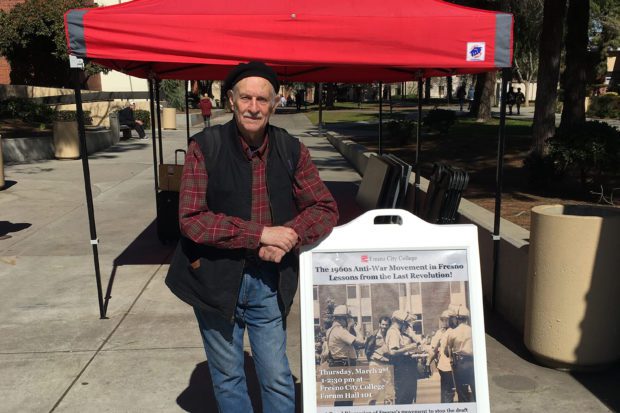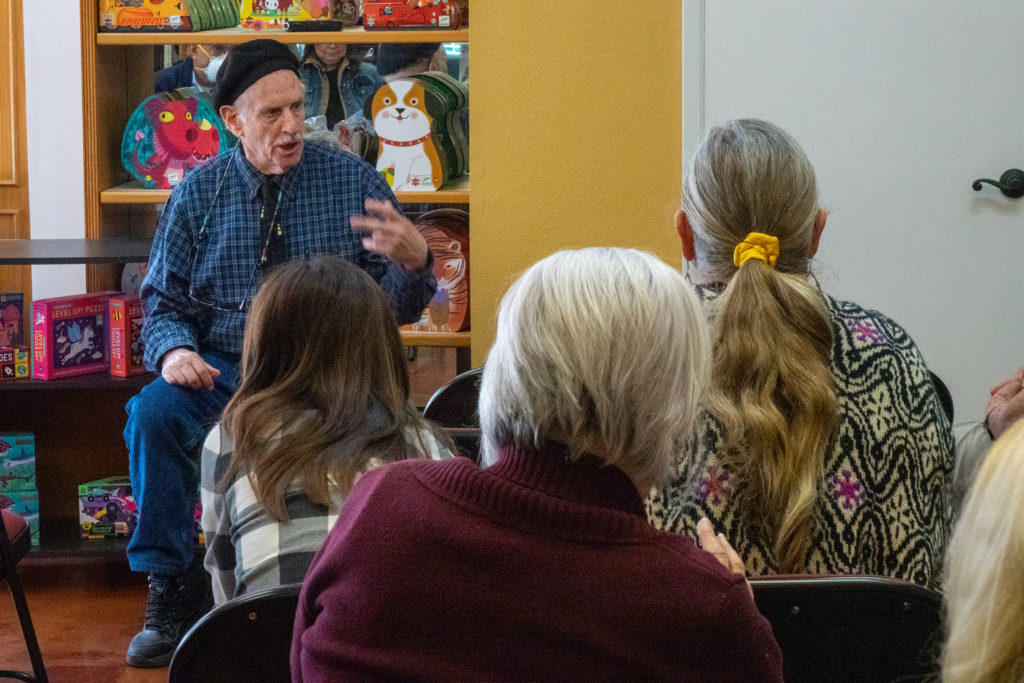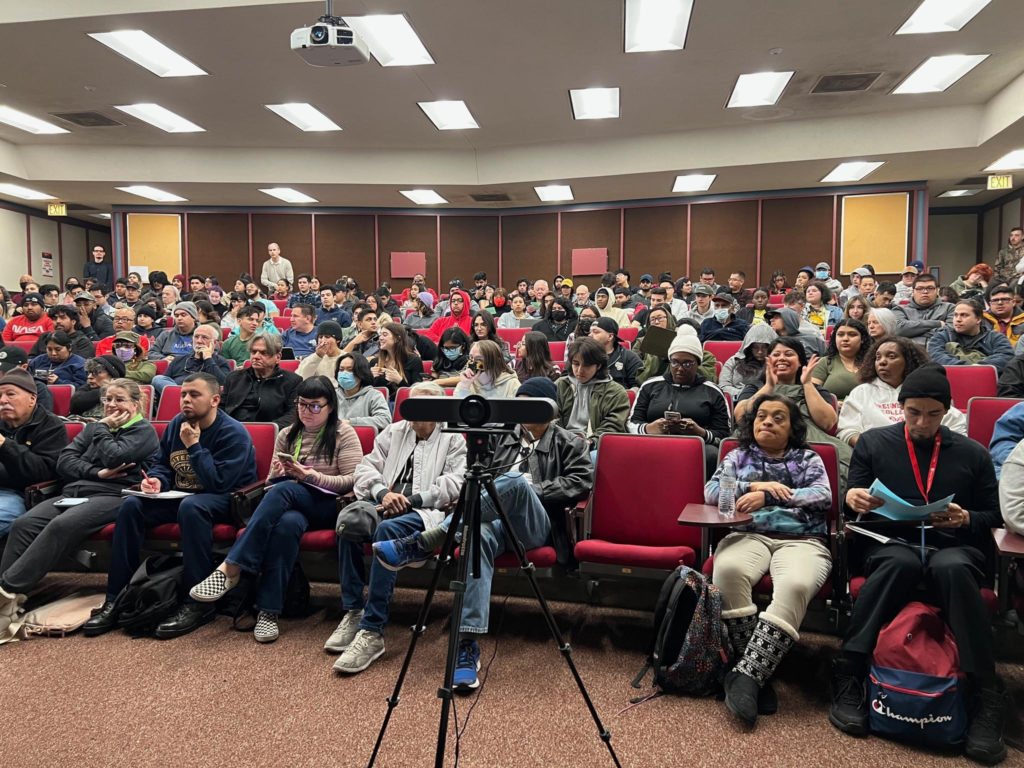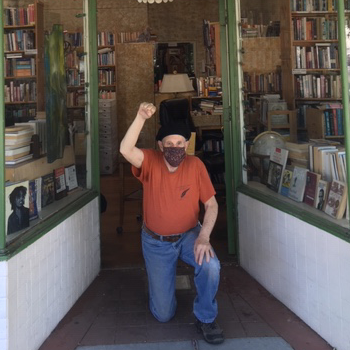
It’s been two generations since I cruised Blackstone Avenue, went to Torquer’s Club dances at the Rainbow Ballroom, made out with a girl in a summer dress parked out in the fig orchards and then marched against the Vietnam War and got myself busted. Many years have rolled over both me and the town I grew up in.
A few weeks ago, I came back for something different.
Because of my political involvement in Fresno, back when I still had hair on my head, I was recently invited back to town by the Community Alliance newspaper, two local colleges and Petunias Bookstore to be part of a panel on “Lessons from the Last Revolution.”

I read from my memoir, Standin’ in a Hard Rain, the Making of a Revolutionary Life, recently published by World BEYOND War in Charlottesville, Va., and chatted about life in the Central Valley back in the day.
With me on the podium at Fresno City College, the location of the main event, was Raul Pickett, former organizer for the grape strike and the Chicano Liberation Front and a student at (then) Fresno State College, and Mike Rhodes, draft resister, longtime activist and executive director of the Community Alliance newspaper. Doug Rippey, a member of El Teatro Campesino and a Fresno draft resister, joined us from Denver through the magic of Zoom. It was a groovy trip.
Despite the efforts of its organizers, the event at Fresno State was not as rewarding as it could have been. The event at Petunia’s Bookstore was a warm, welcoming event with an enthusiastic and appreciative group. The event at Fresno City College was a speaker’s dream. It was well-organized and advertised. There was a room packed to the rafters with eager students of every color of interest. Their instinct that something is wrong in Amerika is on the money.
With three radicals on the podium, this event was about more than me.
In the last 60 years, Fresno has changed in that it is more of the same. It wanders outward instead of upward. Strip malls proliferate like vines watered by money from the one-story banks along Shaw Avenue that look like military bunkers. Covid and the shifts in community have left old shopping districts blighted. Most of the fragrant orchards near town are gone.
If you read the Community Alliance, it will not blow the foam off your latte to hear that the same power brokers from back in the paisley tie-dye days are still pushing people around for their own profit and to hell with the social carnage they leave in their wake.
Few people cruising the strip malls today realize that back in the day, with one of only three army induction centers in California, the grape strike, the political shenanigans at the university and a Black community isolated and depressed, Fresno in the late 1960s was Ground Zero for the last revolution. Its importance as a hot button political town far outstripped its size and location.
The likes of Cesar Chavez, grape strike leader; David Harris, organizer of the National Draft Resistance; and a thriving radical protest poetry scene at Fresno State made it an ideological crossroads.
The panel of old lefties turned the students at Fresno State and Fresno City College on to details from legendary events right out of the pages of their history books. The idea for the panel, “Lessons from the Last Revolution,” was that ordinary people could find themselves caught up in the events driven by a sense of rightness.
If the death of young soldiers from the Valley—most of them Chicanos—could rise from their graves, they’d tell the students that history is personal. That’s the big takeaway from the memoir and the tagline for the book. Despite the fact that we were branded as unpatriotic and dupes of the evil Commie Empire, it turned out we were right.
But that was then, and now. The students know that there is a difference. We are now even more inundated with aggressive anti-information that is engineered to mislead.
Young people, especially targeted by advertising, fad-ism and inflammatory rhetoric, feel they are being lied to but aren’t sure how to see through the razzle-dazzle of non-speak. The most important message from the panelists was not to let the opposition define the terms of the debate.
The panel united in declaring the crucial survival value of determining the sources of what they read and hear. Doing this as a knee-jerk reaction needs to become a national survival sport.

What is needed is a required class at every junior high and high school in America in real media literacy—how to tell the difference between a snow plow and a snow job.
Taking the rhetoric and watchword phrases from the civil rights movement, the manipulators of the White Supremacy Movement have cast themselves as the victim of efforts to level the playing field economically, socially and in the court system for people of color, women and the LGBTQ+ community.
There was an audible gasp in the room when one of the panelists noted that more young women died of then-illegal abortions during the Vietnam War than men killed in action. This statistic never appeared in the mainstream press. It is still eclipsed from histories of the period. This single remark time-warped the connection between the politics of that generation and that of today.
But this is smoke and mirrors. The American worker is the most exploited working class in the history of the world, but they have been convinced that they are the privileged ones, not the exploited ones. That is the cornerstone of their oppression. American workers work harder, longer hours and have the greatest percentage of their income extracted from their labor than anyone else on the planet—living or dead.
The worst thing you can tell an American—especially a white Republican American—is that she or he has been used against their own interests. This is called “faith-based politics,” or “we can say and believe anything we want if we don’t have to actually prove it’s real.”
They’d rather slip into a flak jacket and grab an AR-15 than read your media post complete with real quotes from factual sources. They really hate that. Looking around to find their real enemy is what they are most afraid of doing.
They’d have to pick up the remote and change the channel or worse yet—read a book. They’d have to admit they’ve been used, in which case they’d have to turn all those guns around the other way.
Basically, they can’t stand the idea that they have to share and earn their place in a more competitive world. The right wing actively engages in revising history while it is happening. Truthful information as a basis for saying anything at all is attacked as being against “balanced reporting.” But you know all this.
But here’s a bit of news. On my visit, I learned, sadly, that Fresno State is plagued with a brewing racial crisis. Discussion with Dr. Matthew Jendian revealed a disturbing state of affairs. Students of color have come to him with complaints of harassment by the campus police.
While crowds of white students leave the library with books, Black and Latinx students are stopped and asked to show their library checkout slips. They are accosted by campus cops and asked to show student IDs while moving about the campus. This is racial profiling and harassment pure and simple.
This situation existed on the campus 60 years ago. I felt like this was 1968 all over again. It’s only a matter of time before a cop on too many donuts or a student who’s had a bad day escalates one of these unnecessary confrontations. If these incidents can be, somebody needs to document them with a camera and bring the hammer down on this now.
The students can feel that things are coming around again. There is a sense among the future citizens that they are about to deal with a tectonic shift in history—and therefore their personal lives—that will make the 1960s look like a barbeque compared to a forest fire. Very bad vibes and worse karma.
What I learned on my return to my roots is that what is compelling and miraculous about Fresno is that people there seem willing to listen. That might be its best feature and its brightest hope.
If you don’t like the news, go out and make some of your own.
*****
After a 35-year career teaching and doing professional theater with a slant toward progressive material, Joel D. Eis and his wife Toni now own and run a small used bookstore, the Rebound Bookstore (reboundbookstore.com) in San Rafael. The store serves as a progressive “cultural engine” for the community. His memoir, Standin’ in a Hard Rain, the Making of a Revolutionary Life, is available at Petunias Books (6027 N. Palm Ave., Fresno) or on Amazon.com.

